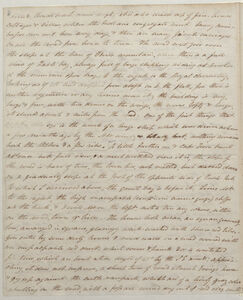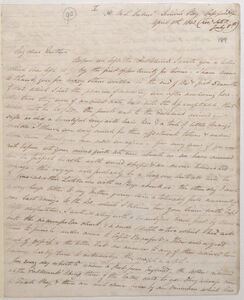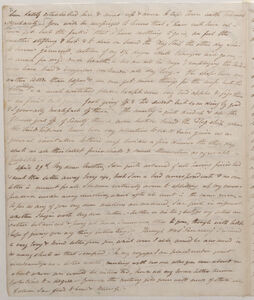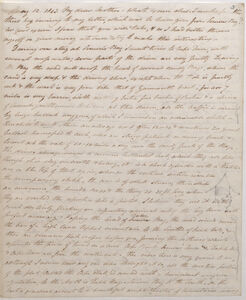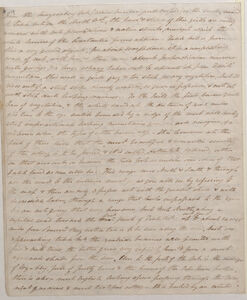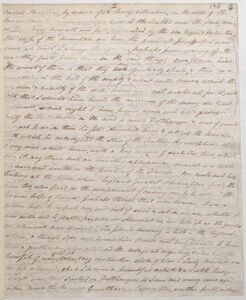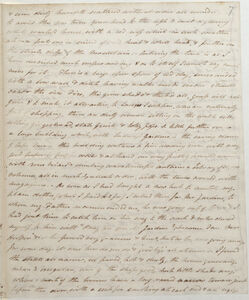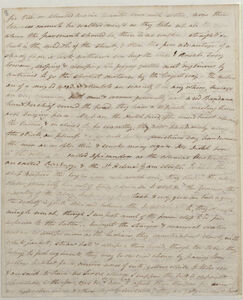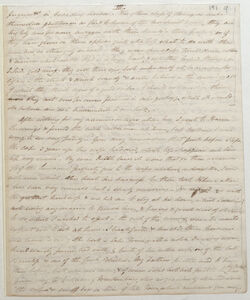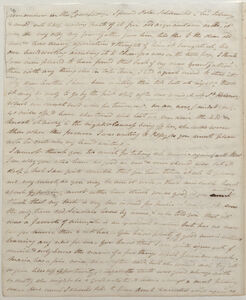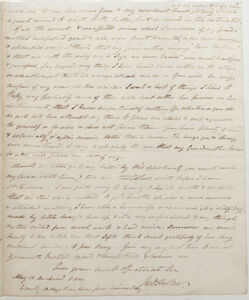JDH informs his Mother, Maria Hooker, that at Cape of Good Hope he has got many letters & affectionate tokens from her. JDH has sent home Davis' circumpolar chart showing the expedition route. JDH has not been to Cape Town yet as he has no good clothes. The only 'society' is the crew of the Flag ship. Simon's Bay village has provided some fresh supplies. Letter continues under date 29 Apr 1843 with excuses for delay &again under date 12 May 1843 having left Simon's Bay. Describes trip from Simon's Bay to Cape Town on a bullock wagon road, includes a small sketch illustration of a wagon driver in typical hat. The route encompassed False Bay, Cape Flats, oak plantations at the foot of Muysenberg [Muizenberg] Mountain, view of Table Mt, David's Mt & the area beyond known in South Africa as 'Hottentots Holland', Wynberg village, an estate called 'Paradise', & 'Feldhauzen' where John Herschell catalogued the southern hemisphere stars. Comments on Herschell calling the Ross Antarctic Expedition 'the folorn hope of Science'. En Route to Cape Town also went through Rondenbosch village, over the slopes of Devils Mt & saw the view of Table Bay with the Royal Observatory & shipwreck. Describes the 'wretched' view of Cape Town flanked by Lion & Devils Mountain. Describes Cape Town itself: the houses, streets, castle & street sellers. The library & Baron Ludwig's Gardens are its only redeeming features. JDH briefly met Mr Jadine. JDH is dismissive of the 'ugly fir trees' in the town. Describes the Cape Town people: African-born Dutch known as 'Africandoes', Malay, Indian soldiers & Merchant Navy sailors. Recounts his visit to Baron Ludwig, Ludwig's current situation, health & house. Ludwig has replaced William Jackson Hooker's portrait with William of Wurtemberg, but still has the copy of Peter Schlemihl from JDH's grandfather. This letter will go from St Helena. Discusses his mother taking up music again & the singing talents of other family members. Writes about 'Betsy'.
Transcript
called Rondebosch comes next, it is also made up of farmhouses cottages & villas, where the Indians congregate most. Many omnibuses run out here every day, & there are many private carriages on all the road from hence to town. The road next goes over the slope at the base of Devils mountain, when there is a full view of Table bay, always full of large shipping riding at Anchor in the immense open Bay: to the right is the Royal Observatory, looking as if it had dropped from aloft on to the flats, for there is neither vegetation or any houses near it; the building is very large & fine, with two domes on the wings, the rooms lofty & large, it stands about 2 miles from the road. One of the first things that catches the eye is the wreck of a huge ship which was driven ashore a few months ago by the NW winds, & totally lost, nothing remains but the kelson & a few ribs. A little further on & Cape Town bursts at once into full view, & a most wretched view it is, the slope of the road is bare of trees, the town lies, not nestled, but clapped[?] down on a gradually slope at the foot of the opposite side of table Mt to what I described above; the great bay is before it, Lions Mt to the right, the high inaccessable[sic] (except in one narrow gorge) cliffs at the back, & Devils Mt on the left; not a tree any where, either on the road, town or hills. -- The houses look mean, are square, generally low, arranged in squares, glaringly white--washed with blue or red tiles. You enter by some dirty hovels & mud walls on a road covered with an impalpable red dust, which covers & paints 3 or 4 wretched fir trees, which are bent at an angle of 45º by the SE wind; approaching, it does not improve, a short turn of road almost brings horse & gig up against the castle ramparts, which are of a lively grey color[sic] abutting on the road, with a top all round dug out of red clay earth
H.M.S. "Erebus" Simon's Bay. Cape Good Hope.
April 9th 1843. (rec[eive]d Sat[urda]y
July 8th.)
My dear Mother *1
Before we left the Falklands I wrote you a letter which was left to go by the first opportunity for home. I have now to thank you for many others written in the end of 1841 & first 5 months of 1842. which I had the pleasure of receiving soon after anchoring here -- this time they were of ancient date, but not the less acceptable, that could not be helped. The Jewels sent to the Falklands arrived quite safe as did a beautiful ring with hair, here, & a lock of little Mary's besides. I thank you very much for these affectionate tokens & value them more than you can well imagine. You may now, if you would not before, set your mind quite at ease about us. We have arrived here in perfect health with sound ships & are on our homeward voyage. this voyage will probably be a long one, but all will be in fine--weather Latitudes with no Bergs about us. The other day I sent a very large letter to my Father giving him a tolerably full account of our last cruize[sic] to the Ice, which I believe has gone home with Capt[ain] Ross' despatches. I sent it along with a beautiful track put by Davis into the circumpolar chart, & a rude Sketch or two which I had not time to finish, under cover to Capt[ain] Beaufort. There was a good deal of gossip in the letter but no answers to any of those received here having hardly time to acknowlege[sic] their receipt in a P.S. --
We every day expect to receive a Post from England, the letters received at the Falklands' being those of the latest date to us. -- They always come to Table Bay & then are sent down hither[?] by an Omnibus which has
been lately established here & runs up & down to Cape Town with tolerable regularity. You will be surprized[sic] to know that I have not been up to Town yet but the fact is that I have nothing to go in, we feel the weather stifling & hot, & to dine on board the Flag Ship the other day I had to borrow garments, not one of my 3 1/2 dozen white trousers will go on; -- so much for my rude health. -- We are all in rags & employing the tailors who have bad & irregular workmen all day long -- The shops here are rather better than before & we can get more things for the mess, but the town village is a most wretched place. Except some very bad apples & figs there is no fruit but grapes fast going off & too sweet, but exceedingly good & I generally breakfast off them. The country is quite dried up & all the flowers gone off. of Society there is none but on board the Flag ship, where the Midshipmen have been very attentive to us & have given us a general invitation to their mess besides a fine dinner the other day sent us all their latest periodicals & made themselves as agreeable as possible.
April 29th. My dear Mother, I am quite ashamed of not having finished & sent this letter away long ago, but I am a bad correspondent & as one letter is meant for all I become naturally averse to splitting up my correspondence under many directions, which after all meet in the same room. -- As far as any of you my dear relations are concerned, I am quite indifferent whether I begin with My dear Father. -- Mother or sister; but as my letters are rather botanical & prosy at times, I commence others to you, though with little hope of giving you any thing interesting. -- Through HMS Samarang I received a very long & kind letter from you, which were I able, would be answered in as many sheets as that occupied. In my voyages I am placed under great disadvantages as a letter writer, meeting with no one who you care about or about whom you would be interested, hence all my home letters become egotistical to a degree. -- You on the contrary fill yours with news of others all of whom I am glad to hear & know of. --
May 12. 1843. My dear Mother. What excuse shall I make for this third beginning to my letter, which was to have gone from Simons Bay? No good excuse I fear that you will take, & so I had better throw myself on your mercy at once & try to make this interesting.
During our stay at Simon's Bay I went twice to Cape Town, with several mess mates; some parts of the drive are very pretty. Leaving the Bay the road cuts across the heads of several sandy Bays, where the sand is very deep & the driving slow, except when the tide is partly out & the wash is very firm like that of Yarmouth beach, for 6 or 7 miles is very barren, with nothing but a few bushes of Proteas & a species of Mesembryanthemum to be seen at this season. All the traffic is carried by huge bullock waggons, of which I remember an admirable sketch in Burchell's travels, there are always 6 or 8 often 12 or 14 & sometimes 20 great bullocks harnessed to each, who are strong patient enduring beasts & travel at the rate of 10--16 miles a day over the sandy parts of the Bay. -- The driver always wears a curious hottentot hat, which they all like though it is very uncouth & heavy, it is a short cylinder with a thatched cone on the top of that again, whence the vertical section resembles the accompanying sketch *2, the cone is of white straw; their whips are enormous, the handle 8 or 10 & the thong 20--30 ft long, when they are cracked the report is like a pistol. I believe they use it with great dexterity, flicking one refractory animal out of the long train with perfect accuracy. Passing the head of Simons False Bay, the road winds round the base of a high table topped mountain to the South[war]d of table Mt, & then an immense flat is open before you, forming the isthmus which separates the piece of land on which Cape Point Simons' Town & Table Mt & Cape Town are, from the continent. The view here is very grand to me, although I never saw any one who thought it so, all the western portion of the flat, (called the Cape Flats) is covered with a luxuriant evergreen vegetation, to the North is Table Bay. -- Simons Bay to the South. On the East a gradual ascent to a beautiful amphitheatre of mountains, running[?]
From the Muysenberg [Muizenberg] Mt (whose base we just crossed) on the South, round to Table Mt on the North West, the base & slopes of this girdle are richly wooded with oak plantations & native shrubs, amongst which the white houses of the Constantia[?] farms appear. Table Mt is from this a very grand object, for about 1000 ft down it is a complete long wall of rock, with here & there some almost perpendicular narrow water gullys, & a huge whang taken out to separate it from David's Mountain, this wall is quite grey & too steep for any vegetation, but it rises out of a steep slope densely wooded, as green as possible, & cut up with steep dark looking ravines. To the East[war]d the flats become quite bare of vegetation, & the white sand at the distance of 4 or 5 miles glistens to the eye, until bounded by a ridge of the most wild rocky steep impracticable looking mountains you can well imagine, of a red brown color[sic], the types of utter barrenness -- It is however at the back of these hills that the most beautiful & romantic country of the colony is to be found, & it is called Hottentots Holland, either on that account, or because the hills look as unlike our ideas of that Dutch land as can well be. This range runs North & South & through all the roads to the interior must go, as you will see by referring to the map & there are only 3 passes cut with the greatest skill & with incredible labor[sic], through a range that looks impassable to the eye -- We are not going that way, however, but keep North, along a capital road towards the North East flank of Table Mt -- up to out for about 14 or 15 miles from Simon's Bay not a tree is to be seen along the road, but on approaching table Mt the roadside becomes well planted with firs & oak trees, the latter grow very rapidly here & form a most agreeable shade from the sun. Close to the foot of the Mt is the village of Wynberg, full of pretty lanes & the houses of the Cape town people, there is also a most English looking spire peeping through the trees, neat gardens & most tasteful cottages. It is backed by an estate
called Paradise, by reason of its lovely situation, on the slope of the Mountain & commanding a view to the South[war]d over the flats, down on Wynberg beneath one's feet, & bounded by the sea beyond Table Bay. The cliffs of the Mountain are here the grandest for effect I ever saw, at least I always thought so, perhaps from coming off the sea. they quite frown down on the road though 3000 ft over head; The worst of them is that they look are essentially sterile, & there is a something in the look of the empty & silent water courses which the verdure & beauty of the slope below will not make up for. I quite felt that I should have heard the murmur of the many distant cataracts, which ought to have poured down each little gully. One of the first houses on the road is called Feldhauzen & was of great interest to us, as there Sir John Herschell lived & set up the Telescope with which he catalogued the stars of the Southern Hemisphere. it is a very nice white house, with a long avenue of dark Fir trees, which give it any thing but an inviting appearance, near it is a little monument erected on the position of the Telescope. One could not help looking at the place where England's greatest Philosopher lived; the man too, who paid us the compliment of calling our Expedition "the forlorn hope of Science" perhaps though that was because it was a forlorn hope to expect any good out of such a set as we are, -- whether it was intended to flatter, frighten or stimulate us, we take it as the greatest compliment ever received. Sir John's memory is held in the highest esteem, & though I do not know him I could not but be pleased to hear how a gentleman who attended the college at Wynberg, & who had the benefit of some of Sir Js voluntary instruction, spoke of him. Lady Herschell was no less esteemed, she is I believe a beautiful artist & a Scotch Lady. -- So it was that I looked on Feldhauzen, as I once did many years ago, upon Woolsthorpe near Grantham. Passing this, another pretty village
called Rondebosch comes next, it is also made up of farmhouses cottages & villas, where the Indians congregate most. Many omnibuses run out here every day, & there are many private carriages on all the road from hence to town. The road next goes over the slope at the base of Devils mountain, when there is a full view of Table bay, always full of large shipping riding at Anchor in the immense open Bay: to the right is the Royal Observatory, looking as if it had dropped from aloft on to the flats, for there is neither vegetation or any houses near it; the building is very large & fine, with two domes on the wings, the rooms lofty & large, it stands about 2 miles from the road. One of the first things that catches the eye is the wreck of a huge ship which was driven ashore a few months ago by the NW winds, & totally lost, nothing remains but the kelson & a few ribs. A little further on & Cape Town bursts at once into full view, & a most wretched view it is, the slope of the road is bare of trees, the town lies, not nestled, but clapped[?] down on a gradually slope at the foot of the opposite side of table Mt to what I described above; the great bay is before it, Lions Mt to the right, the high inaccessable[sic] (except in one narrow gorge) cliffs at the back, & Devils Mt on the left; not a tree any where, either on the road, town or hills. -- The houses look mean, are square, generally low, arranged in squares, glaringly white--washed with blue or red tiles. You enter by some dirty hovels & mud walls on a road covered with an impalpable red dust, which covers & paints 3 or 4 wretched fir trees, which are bent at an angle of 45º by the SE wind; approaching, it does not improve, a short turn of road almost brings horse & gig up against the castle ramparts, which are of a lively grey color[sic] abutting on the road, with a top all round dug out of red clay earth
& some dirty hamlets scattered without order all round. to avoid this you turn your head to the left & meet a glaring white washed house with a red roof which in such weather at once puts one in mind of a red heat & white heat, & further on the sterile cliffs of the mountain. Entering the town is as I have described much unpromising & as to itself I cannot say much more for it. There is a large open space of red clay, surrounded with a low wall & ditch, having walks inside under slender oaks & the vile Firs, this gives shade & that is all, grass will not grow & to make it attractive, to Ladies I suppose, who are naturally fond of shopping, there are dirty women sitting on the walk sites selling gingerbread, stale fruit & lolly pops. A little further on is a large building which, with Ludwig's Gardens, is the saving clause of Cape Town -- this building contains a fine reading room with every good paper in proper order & at hand, one wing prettily planted round with roses briars & climbing convolvuluses contains a Library of 30,000 volumes, all in most excellent order, with the tables covered with magazines. As soon as I had bought a new hat to match my plain clothes (which I paid £2 for) I called there for Mr Jardine, to whom my Father recommended me, he was going out of town & I had just time to catch him on his way to the coast & introduced myself to him with "Pray are you Mr Jardine? -- because I am Mr Hooker" &c.. he proved very gracious & kind, but as he was going away for some days it was "how do you do" & "good bye" all at once -- I found the streets all narrow, ill paved, hot & dusty, the houses generally mean & irregular, some of the shops good, but little shade any where: most of the houses have a long round narrow terrace just before the door, with a seat for smoking at each end & an ugly
fir tree or stunted Acacia planted over each settee. Now these terraces cannot be walked over, & as they take up all the room where the pavement should be, there is no walking straight on but in the middle of the street, & then the poor advantage of a shady side is lost, without you hug the wall & double[?] every terrace, crossing & recrossing the zigzag gutter most ingeniously contrived to go the shortest distance by the longest way. The natives are of a mixed breed. Hottentots are scarcely seen anywhere, Malays are very common, both men & women, generally with a red Bandana handkerchief round the head, they have a separate meeting house and burying place. Next are the dutch breed, often round built especially the ladies, & inclined to be swarthy, they roll handsomely along the streets, are plump & often well looking, sometimes very handsome the men are as often thin & smoke many cigars. All Dutch born in the colony are called Africandoes[?] as the colonial Australia[n]s are called Currency *3 & the St Helena's Yam stocks. Except the shop keepers the English are not much seen, they comprise the upper classes, generally live out of town & drive in to shop &c. The Governor, the vice--Roy of the Colony, keeps a very poor table & only gives one ball a year, the society is quite divided between the Dutch & English; they do not mingle much, though I suspect much of the former class to be far superior to the latter. Amongst the strangers & occasional visitors none are so conspicuous as the Indians, they saunter about slowly with white Jackets, straw hats & whips in their hands, though ten to one they belong to foot regiments, they may be descried at once by having long yellow hatchet faces, curious noses of sorts, yellow whites to their eyes & are said to have no Livers, whence I suppose the bile be deposited elsewhere, in the face, eyes &c, so much as & even to affect their tempers for some[?] are hypochondriacs & others highly irritable, they are gregarious & live
frequently in boarding houses. The other class of strangers dub themselves gentlemen or Midshipmen of the Merchant Navy, they are highly conspicuous, swagger with their hands in their pockets, or if they have gloves on them appear quite at a loss what to do with these members, so strangely encased. they wear open necks, turned down collars, & narrow neck--cloths tied in a huge knot, & after that passed through an E. Ind. gold ring; they roll their eyes, look impudently at ladies, smoke cigars in the streets & drink brandy & water betimes in the morning; all of which they think signs of a good sailor. I should not mention these were were they not conspicuous features in cape zoology, which it would ill behove me as a naturalist to overlook.
After settling for my accommodations at an Inn I went to Baron Ludwig's & found the little nobleman at home, but looking I was sorry to see very poorly -- You may remember that just before I left the Cape 3 years ago his wife had died, which loss it appears cut him up very much -- By some Dutch laws it seems that on these occasions 1/3 of the husband's property goes to the wifes relations, or daughters, I am not sure which; this bust his business; he then took Rheumatism & has been very unwell, but is slowly recovering -- He received me with the greatest kindness & wished me to stay at his house, which I declined, not seeing any occasion to trouble him, & having a great deal of shopping to do, which I wished to effect in the cool of the evening, when he would expect me to sit at home. I breakfasted & lunched there however. His house is one of the best in Cape Town, with a noble Drawing room, handsomely furnished with 2 busts of his noble self, one of the late Baroness & one of the poet Schiller. My Fathers picture used to hang there before, but was not now, & of course I did not ask for it: -- he my Father has given way to William of Wurtemberg, who so graciously showered down the crosses & snuff box on him of Cape Town, which emblems you may
remember in the Crescent. I found Peter Schlemihl in his Library & could not help reading part of it from old acquaintance sake, it was the very copy my Grandfather gave him, tell this to the dear old man & how many associations & thoughts of him it brought up; his own handwriting ascribing it to Chamisso was on the title page, I think I was more pleased to have found that book of my dear Grandfather's than with any thing else in Cape Town, I had a great mind to steal it.
My dear Mother, I have been writing this till late at night, that it may be ready to go by the first ship after our arrival at St Helena, which we doubt not will be tomorrow. We are now (midn[igh]t) only 40 miles off, & have shortened sail lest we run down the Isl[an]d & knock it away in the night. -- Canvass being off her, she rolls worse than when this prenoon I was writing to Bessy, so you must please not to criticise my handwriting. --
I cannot thank you too much for taking up music again (not that I see why you who have so good an ear & voice should ever let it drop) but I am quite sensible that you have taken it up to please me very much, as you may be sure it will. -- That miserable howl about Gypseying[?] must either have struck you as good, or you [1 word crossed out, illeg.] must think that my taste is very low indeed for music. I suspect it was the only tune old Sinclair knew by name, & so he told you that it was a favourite of mine, -- he is an excellent creature but has no more ear for music than a cat has. -- You know plenty of good music without learning any new for me. You know that I am quite ignorant of music & only know the names of a few things which please me much. Maria has a fine voice, as we often said, but she would not try it or give herself opportunity; & Elizabeth's taste was good always: with industry she might be a good artiste & Maria always a most pleasing one. -- How much I should like to hear Aunt Harriettes voice again as
well as to see her dear face & my excellent Uncle John's not his voice though in song, I have a great mind to write to the latter, but he would be too astonished.
Of all the sweet & unaffected voices what I remember of my Grandmother's surpassed your's[sic] & all, even Aunt Harriette's, a far more powerful & splendid one. -- I think that my Grandmothers singing "Rule Britannia" & that air with the silly words "Sigh no more ladies" was most beautiful & graceful, far beyond any thing I have heard since either on the stage or elsewhere, at least it always struck me so. -- You will be very careful of my dear sisters voices -- I sent a list of things I liked to Bessy, very probably none of them will suit either her powers or her instruments, that I know unfortunately nothing off. Whatever you do do not let her attempt any thing to please me which is not agreeable to yourself or Maria or does not please them. You have plenty of sacred & especially of Haydn's music, better there is none. The songs you & Mary were accustomed to sing & especially the airs that my Grandmother knew so well will please me best of any.
Should no letter go to my Father by this opportunity you must make my peace with him, & tell him that I shall write before I leave.
St Helena. -- I am quite sorry to hear of Betsy's ill health & do hope that ere this she is restored to good health, she was a most amiable & attached creature, I have still a housewife or as we call it a ditty--bag made by little Mary & herself, & it is very useful indeed to me, though rather soiled from much work & hard service. Remember me most kindly to her & tell her that I often think most gratefully of her long continued kindness to poor Mary. -- Give my very best love to all at Yarmouth, Irestead, Oxford & Hampstead & believe me
Ever your most affectionate Son | Jos. D. Hooker[signature]
May 13 anchored 8 am
Exactly 13 days to an hour from Simons Bay.
1. Lady Maria Hooker nee Turner (1797--1872).
2. A sketch of the hat is drawn on the right hand side of page 3.
3. A native born Australian. In the early days of the Australian colony English gold pieces were called sterling, but there were also ‘inferior’ coins from many countries. These were called currency. The ‘sterling’ British born immigrants used the word currency to belittle the native-born Australians, but the Australians soon used it of themselves with pride. First recorded 1824.
4. Peter Schlemihls wundersame Geschichte (Peter Schlemihl's Miraculous Story) (1814) by Adelbert von Chamisso.
Please note that work on this transcript is ongoing. Users are advised to study electronic image(s) of this document where possible.
Powered by Aetopia
